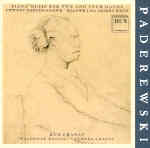Most virtuoso pianists for whom composition played a secondary role tended to write music that primarily showcased instrumental prowess. Paderewski’s case, however, differs from the norm. His keyboard writing is certainly effective and idiomatic, but somehow it never quite “wows” you. Instead you wind up focusing on the composer’s melodic charm, wistful sentiment, and forthright craftsmanship, even among Op. 14’s stylistic pastiches (the famous Minuet in G, for instance).
Waldemar Malicki’s warm sonority, solid fingerwork, and keen ear for local detail make themselves felt throughout his solo selections. He begins the Minuet with relaxed rumination, giving no clue of the explosive left-hand octaves to come. He lingers just enough over the Op. 16 B major Nocturne’s drawing-room harmonies and makes a good case for the A major Minuet’s compositional superiority over its more celebrated sibling. In the Cracovienne Fantastique, I prefer, on Altarus, Adam Wodnicki’s lighter touch and the greater rhythmic snap he gives to the double notes.
Tamara Granat takes over for the Op. 14 Sarabande (a little weightier and less interestingly voiced than Wodnicki’s) and the facile but hardly easy-to-play Théme Varié. Both pianists admirably team up for the six Op. 12 miniatures, whose folkloric leanings and volatile pulse-swings belong to the same gene pool as Brahms’ Hungarian Dances (No. 6) or Chopin’s Mazurkas (No. 5’s pungent harmonies). Paderewski may not have been an original creative talent, but his music speaks its peace eloquently and well. Worth hearing.
































